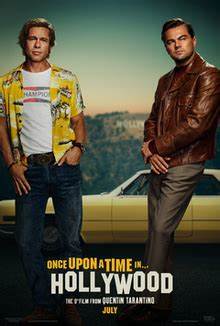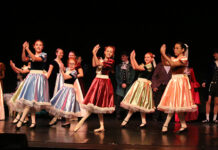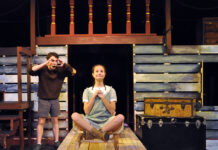“Once Upon a Time in Hollywood” is the ninth film written and directed by Quentin Tarantino and stars Leonardo DiCaprio, Brad Pitt and Margot Robbie as three different Hollywood types in 1969 Los Angeles. DiCaprio plays Rick Dalton, a longtime star of a western TV series in the 50s, Pitt is his stunt double and friend, Cliff Booth and Robbie portrays up-and-coming young actress Sharon Tate, who happens to be Rick’s neighbor.
It’s tough to come up with a clear way to critique and talk about this film because like a lot of Tarantino’s other installments, there isn’t a cohesive structure to the plot. In fact, it’s hard to find much of a plot at all. We’re really just peering into these people’s lives for a little while and getting to know them while they exchange some clever Tarantino dialog. There is much more attention given to the setting than there is to a plot and Tarantino has clearly put a lot of effort into recreating Hollywood at the height of the hippy era. There are some obvious allusions to the bloodier side of that era that finally come to a head at the end of the film but with a little bit of a twist on them this time around.
As far as our main characters, we get a lot of time from Dalton’s and Booth’s perspectives while we sort of watch Tate go about her day without getting a clear idea of what’s on her mind. There are a couple of touching moments with Tate in a movie theater that help us understand her ambitions, and Booth’s humanity can be seen when he’s with his dog, but the character we get to know the most is DiCaprio’s Dalton. As a former star from an older era of Hollywood, Dalton is facing his own mortality as a celebrity and coming to terms with his declining status. He has several scenes in which he deals with a range of emotions while everyone else is pretty one note from start to finish. He’s the only one I feel like I know better now than I did at the start of the movie.
Overall, the most puzzling thing about “Once Upon a Time in Hollywood” is that there isn’t a beginning, middle and ending or even loose story threads to that come together in a coherent way. Tarantino gives us another ending that puts an alternate spin on some actual historical events like he’s done in the past, but otherwise, the point of the film seems to have been to capture the look and feel of Los Angeles at a particular moment in time. If that was his goal, he’s certainly achieved it, but I don’t think it’s enough to push his newest picture into the upper echelon of his filmography. If you’re a Tarantino fan, it’s definitely worth a watch, but for the casual moviegoer it may be a slow burn.
Griffin’s score: 7/10























